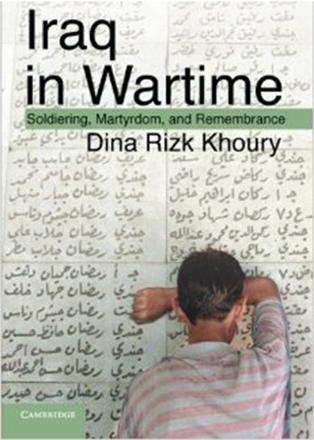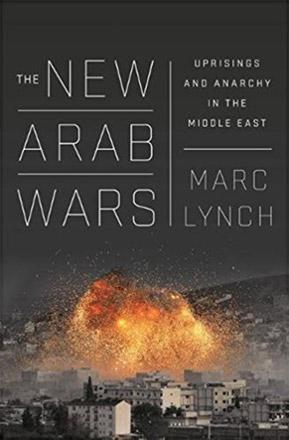You are here
How war became the norm
By Sally Bland - Nov 20,2016 - Last updated at Nov 20,2016

Iraq in Wartime: Soldiering, Martyrdom, and Remembrance
Dina Rizk Khoury
Cambridge University Press, 2013
Pp. 281
This book’s starting point is a fact often overlooked by policymakers: “When US-led forces invaded Iraq in 2003, they occupied a country that had been at war for twenty-three years… war had become the norm rather than the exception.” (p. 1)
Much has been written about the Iraq wars, but few have addressed them from the angle of how Saddam Hussein’s regime dealt with the consequences of war in such a way as to normalise it. Dina Rizk Khoury, professor at George Washington University, also explores how Iraqis of different generations, regions, classes and affiliations reacted to the regime’s measures.
“Iraq in Wartime” begins with a review of the wars fought during Ba’thist rule: the long, conventional war against Iran, the counterinsurgency of the 80s and 90s in the North and South of the country, the 1991 US invasion, and the UN-sanctioned embargo which has been termed an “invisible war”. “Clearly, the process of rendering these seismic ruptures in Iraqis’ lives into part of the business of living was no small undertaking.” (p. 5)
With war sapping resources, state development policies were scaled back, while the Ba’th Party’s bureaucracy and security role was exponentially expanded. Faced with rapidly changing circumstances, state policy was often improvised, but it also entailed massive, systematic record keeping to determine who was eligible for a share in dwindling resources, and who was considered a threat.
In examining “war as a way of governing that structures everyday lives”, Khoury focuses on “key categories of people — soldiers, deserters, prisoners of war, and martyrs’ families — all of whose mobilisation, control, and acquiescence were central to the state’s ongoing ability to wage war and who were therefore the target of myriad state policies”. (p. 2)
Though war was mainly the business of men, the book also traces its impact on women’s rights, once quite advanced in Iraq, and their role in the family and society.
Already in the Iran-Iraq war, desertion became a major problem despite new mechanisms of control, and deep fissures emerged in Iraqi society, especially due to the parallel counterinsurgency campaigns. Khoury puts less emphasis on the sectarian basis of such fissures than on the effects of the war situation and related regime policy. While the rebellion in the South following the US invasion is often termed a “Shiite” uprising, Khoury reminds that over 100,000 Iraqi soldiers returned from Kuwait in just a few days, viewing the uprising as “fuelled by returning soldiers who were hungry, defeated, bedraggled, and tired of being at war… its participants were those sectors of Iraqi society that had suffered most during the Iran-Iraq war and the First Gulf War”. (p. 133)
As Iraqis reeled under the impact of successive wars, the regime redefined the parameters of their lives via seemingly bureaucratic means, though these had political intent. Citizens’ rights were categorised according to their war service, determining access to or denial of entitlements, and the meting out of punishment.
Martyrdom itself was redefined as civilians came to constitute a growing portion of war casualties, and the image of the strong, victorious Iraqi soldier gave way to that of Iraqis as victims. At the same time, the deliberate revival of tribalism and economic privatisation changed the value system previously espoused by the Ba’th, and the rules by which people struggled to survive.
Two chapters of the book involve culture, chiefly how the regime worked to monopolise the narrative through which Iraqis understood and remembered war, and how martyrs were commemorated. Here one gets a taste of the photos, journalism and literature produced during the wars, how they changed, and how they were discussed among Iraqi intellectuals, both those involved in these efforts in Iraq, and dissidents in exile.
Khoury’s postscript is sobering: “as of this writing, neither the Baghdad nor the Arbil government has attempted to develop a war narrative in a manner that could forge a pluralistic, non-authoritarian, national consensus on the legacies of Iraqis’ encounter with violence…” (p. 245)
With Iraqis caught up in yet another war, this time against Daesh, one can hardly imagine this happening any time soon.
Khoury’s assessments gain credibility from her broad array of sources, ranging from Iraqi state and Ba’th Party archives, to interviews conducted in Amman and Damascus in 2007-9, with Iraqi men who lived the successive wars. On issues that usually spark heated debate, she charts a judicious course that is only biased towards the welfare of the Iraqi people.
Perhaps most importantly, Khoury steers clear of dealing with Iraq as an aberration, making the book relevant for understanding what is happening in other parts of the world. In her words, “The normalisation of war is neither a symptom of Iraqi exceptionalism nor simply a product of the militarism of the Ba’thist regime. Rather it is a condition Iraq shares with a number of other countries, democratic and authoritarian, in the post-Cold War period.” (p. 3)
Related Articles
Twitter was the platform for a heated political debate this week between British Ambassador to Jordan Peter Millet and Jordanian MP Tarek Khoury over Syria.
Falastin Al Hadara ‘abr Al Tarikh — Palestinian Civilisation throughout HistoryTranslated from the Arabic by Joud Halawani Al TamimiAmman: T
The New Arab Wars: Uprisings and Anarchy in the Middle EastMarc LynchNew York: Public Affairs, 2016PP.


















